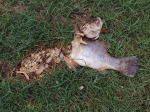Fish deaths a double whammy
By Melissa Lin, 16th February 2014;
Business at Ms Noven Chew’s two coastal fish farms was already bad.
Since last year, the 37-year-old has been facing stiff competition from Malaysian farmers who sold their fish here at prices cheaper than she can afford to sell her produce.
During Chinese New Year came an even bigger blow which is set to sink her business. Almost 7,000 fish – nearly her entire stock – died within a span of one week.
The five tonnes of dead fish included Sea Bass (Barramundi) (Lates calcarifer), Tiger Grouper (Epinephelus fuscoguttatus) and Mouse Grouper (Humpback Grouper) (Cromileptes altivelis), which can fetch between $80 and $100 per kg, she said.
The losses cost her $15,000. And if the fish had grown to their maximum size, their worth could have as much as doubled, she estimated.
Others were also not spared the sudden mass deaths – 39 farms in the East and West Johor Strait lost around 160 tonnes of fish.
That is around 3 per cent of what local farms produced in 2012, according to Agri-Food and Veterinary Authority (AVA) figures.
Last Thursday, AVA attributed the deaths to low levels of dissolved oxygen and a plankton bloom due to hot weather and high tides being at their lowest levels.
Signs that something was amiss began showing a few days before the start of Chinese New Year late last month, said Ms Chew.
Neighbouring fish farmers told her that their Coral Trout (Plectropomus sp.) – which she does not rear – were dying. A check in the waters around her farms found that fish were avoiding the area.
As a safety precaution, she moved a few hundred of her giant groupers into mussel nets. Mussels (Perna viridis) eat plankton and act as a filter, she said.
They survived, but she did not have enough mussel nets to save her other fish.
Ms Chew’s losses could have been worse if she had not diversified her business following a plankton bloom in December 2009, when 25 tonnes of fish worth $70,000 died in her farms.
After that setback, she and her business partner, Singapore Marine Aquaculture Cooperative chairman Phillip Lim, decided to rear lobsters (F. Palinuridae). Their farms now have more than 10,000 of the crustaceans, which were unaffected by the recent deaths.
“We didn’t want to rear so many fish because the price of local fish was dropping,” Ms Chew added.
Sea bass from Malaysia can be bought for the retail price of as low as $5 a kilogram, but for local fish farmers, it costs $8 just to rear the same amount of fish, she said.
The Institute of Technical Education graduate had previously worked as a retail assistant, a wonton noodle seller and a chicken rice seller.
The divorcee went into the fish farming business in 2008, thinking it would allow her more time with her daughter, now 12.
A year later, she sold her four-room flat in Sembawang for $350,000, and invested the entire sum into her business. Now she lives on one of her farms – each of which sits on 0.5ha of sea area off the coast of Changi – while her daughter lives with her former mother-in-law.
Ms Chew owns the farms but pays an annual licence fee of $850 for each of them. She declined to reveal how much she earns from farming.
Last Thursday, Minister of State for National Development Mohamad Maliki Osman said farmers affected by the recent mass deaths do not have to worry about missing mandated productivity targets. Each year, fish farms must produce 17 tonnes of fish for every 0.5ha of space to keep their licences.
But this is cold comfort to Ms Chew, who does not have any savings and may have to head to the mainland to find a way to support herself and her daughter.
“I’ll have to find a part-time job outside. I want to support the national food security efforts, but how can I do so if I can’t even support my own family?”








